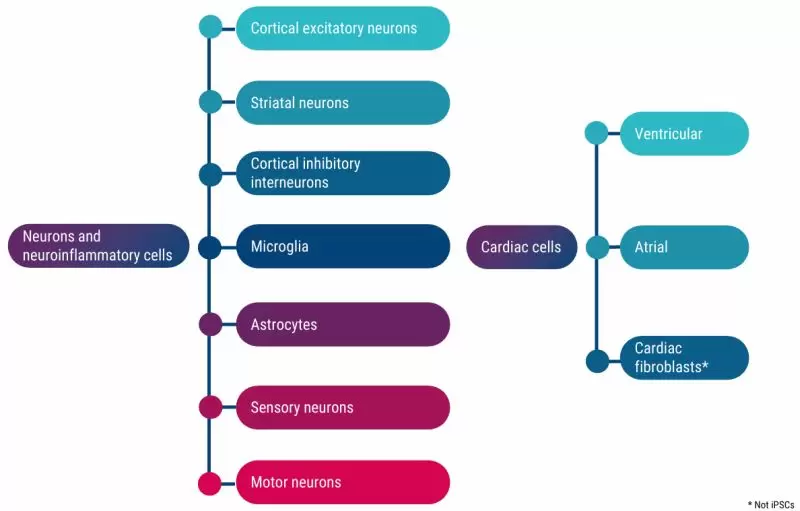
iPSC-Derived Human Cells
Human iPSC-derived Cells with Excellent Consistency
Better in vitro models with high-quality, functional iPSC-derived cells
As drug discovery continues to explore more human-relevant approaches to disease modeling, human induced pluripotent stem cell (iPSC) technology is gaining momentum. Using this technology, consented blood or skin donations from patients and healthy donors are ‘reprogrammed’ into a stem cell state, from which they can be turned into any cell type including neurons, neuroinflammatory cells, muscle cells and cardiac cells. Importantly, they retain the behaviors of the disease state.
iPSC-derived cells can then be grown on their own in monocultures or in co-cultures of different cell types to make advanced in vitro models for research, toxicity studies and drug discovery. These models can be used to test compounds for safety and effectiveness.
While monoculture models offer a valuable format for iPSC-based research and drug discovery, stepping up from monoculture to co-culture can unlock better insights, greater human relevance and improved data outputs, making co-culture models a valuable addition to in vitro research projects.
Co-culture models involve the use of two or more iPSC-derived cell types (e.g. neurons, microglia and astrocytes) in an in vitro format. This can help researchers to incorporate greater complexity, cell-cell crosstalk and a more physiological representation of the in vivo environment.
axoCells Human iPSC-derived Cells
Human iPSC-derived cells have been specifically developed by Axol Bioscience to fuel advanced in vitro systems for drug discovery and drug safety.
• Neurons: Cortical excitatory neurons, striatal neurons, cortical inhibitory interneurons, sensory neurons, motor neurons
• Neuroinflammatory Cells: Microglia, astrocytes
• Cardiomyocytes: Atrial cardiomyocytes, ventricular cardiomyocytes

Overview of axoCells Human iPSC-derived Cells.
Research Areas
We provide functional human iPSC-derived cells to explore:
• Neuroscience: modeling neurodegenerative and neuroinflammatory diseases including ALS, Alzheimer’s disease and Huntington’s Disease
• Pain & Sensation: modeling pain and sensory function for drug discovery and neurotoxicity testing
• Cardiovascular: using functional cardiomyocytes to model cardiac diseases (including arrhythmias) and for cardiotoxicity screening
Additional Products
In addition to human iPSC-derived cells, we provide a range of supporting products including specialized media and supplements capable of drastically speeding up cell maturation times, but also essential growth factors, like BDNF, CNTF, and NGF, and solutions used during expansion and passaging.
The complete kits offered typically include human iPSC-derived cells, the supporting cell culture media, and any supporting reagents and supplements. They have been designed and grouped together to synergize and get you the results your research needs sooner.